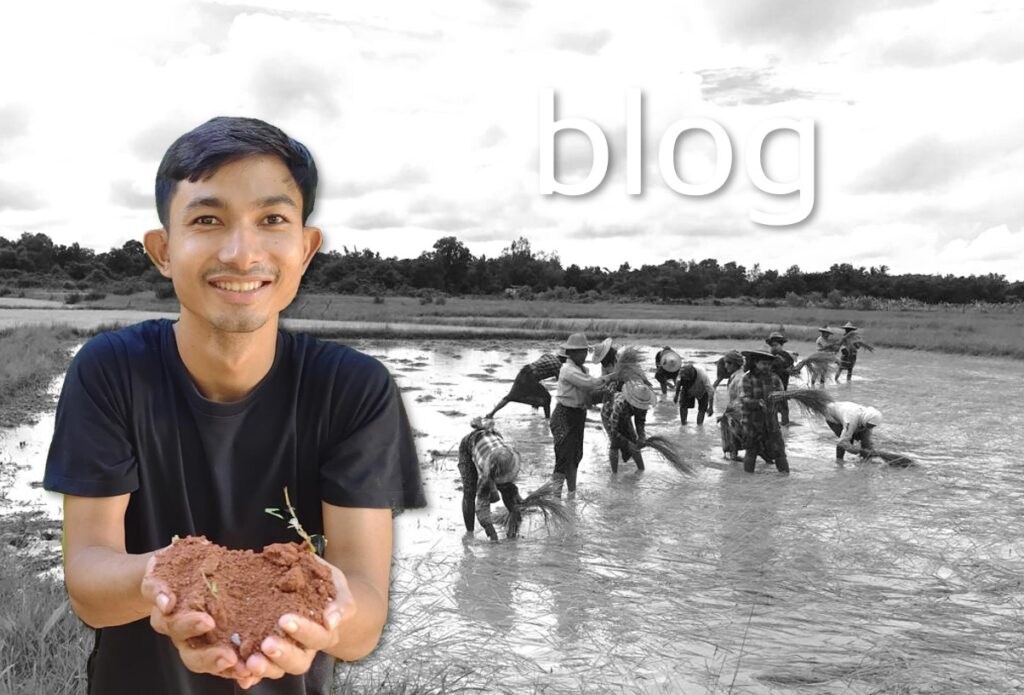Myat Tun grew up in a small village in Western Myanmar. No internet, no electricity, just the simplicity of rural life. In 2013, a child once without any dream became a nature enthusiast. With the experiences and knowledge in nature conservation, Myat returned to his home state, Rakhine to empower rural youth in sustainable agriculture, permaculture, and nature conservation through the Permaculture Institute, Myanmar.
By Myat Tun
Roots in Rural Simplicity
I am the third-born child in a small village called Ran Aung Pyin, which is surrounded by a salty creek full of mangroves. Before 2010 life was very tough, with no means of communication. Even a ten-minute phone call required an eight-hour boat ride to Rathedaung. News from Yangon took weeks or sometimes even months to reach us.
My father wished I would become an engineer so I would not have to work at the shrimp farm. But my heart yearned for the simplicity of rural landscapes, paddy fields, grazing animals, and beautiful wildlife. My parents had been struggling a lot to support our education. Our paddy land, and other family property… nearly everything was sold. Apart from these struggles, I together with my siblings and friends enjoyed our pleasant times. At the end of 2012, my parents sent me to Yangon. I worked in a clothing factory for two months. In 2013, I got a great chance to study at NEED Myanmar’s eco-village farm school. NEED Myanmar has been empowering rural adults from diverse ethnic backgrounds in sustainable agriculture, environmental conservation, and community development.
Education Transforms Ambition
After studying at NEED, I desired to restore the deforested mangrove and educate the youths and children about the importance of mangroves and wild animals. With two NEED alumni, I led the three-day farming workshop for organic farming practices in my village. During the training, I realized that I still had limitations for community empowerment in terms of nature conservation and youth empowerment So I tried to seek further opportunities for my career development. In 2016 I joined Kant Kaw Education Centre where I also increased my knowledge about social issues and global affairs. My first experience with nature conservation started with Fauna and Flora International (FFI) in 2016, raising awareness of wildlife conservation at the state schools in Myeik township. After my internship period at FFI, I came back to my village where I started the Lighthouse Centre, educating local youth about social media and basic computer skills.
Challenges and Awakening
Upon return home, I noticed a big change; deforestation and desertification, depletion of the fish stock, and no more animals in the field which had turned dry due to water shortage. I also noticed that young people had left for Thailand or Malaysia looking for better economic opportunities. This mass migration was not only from my village but also from many other parts of Rakhine. Because the government had blocked road access to my village, there was no market for the farm vegetables and crops anymore. All of this pushed the rural community into poverty. Even though I was seeing these things in front of me, I could not help my community. My financial constraints forced me to find a job elsewhere. In 2017 I started a job at Istituto OIKOS which showed me the effects of deforestation.
Initiating Change through Permaculture
I found that young farmers had the potential to transform their land into a more sustainable and eco-friendly land-use system while working at NEED. I asked myself, why don’t rural young people want to live in their rural communities? Why is the number of farmers who abandoned their farmland and migration abroad growing? Why does farming have such a negative connotation? What is my passion and how could I change this? After thinking deeply about these questions, my heart won over my brain. I listened to my heart, so I decided to invest my time in changing this situation. Farmers are the fundamental backbone of a community and they should be environmental conservationists, frontline fighters against climate change, and grassroots peacekeepers. The simplicity of my past childhood life forces me to follow my real passion. Therefore, I decided to join Johanna Garnett and Than Shwe in initiating the first permaculture institute in Myanmar. As a first step, we purchased nine acres of land in Rakhine in 2019.
From Passion to Action: Building a Sustainable Future
Our collective dream is to empower rural youths from diverse ethnic backgrounds. We do this by equipping them with skills that lead to new livelihood opportunities. Additionally, we train ethical, driven young farmers in permaculture, sustainable organic practices, and ecosystem restoration. By doing so, I strongly believe that I can play my role as an environmental educator. To further develop our organization, I needed skills to run the venture professionally. So, I applied with hope and belief that kanthari could equip me with the skills I need for life’s next chapter. This is what I want to do: Each year, 25 rural youth will be equipped with the skills of leadership, sustainable farming, permaculture farm design, environmental conservation, conflict prevention, and resolution. Three years after program completion, each alumnus would have shared the farming techniques with 20 other farmers. This will result in a total of 750 farmers who will know, understand, and adopt the permaculture principles. Through our PIM alumni network, we will create a farmer cooperative among these farmers. By introducing a Community-Supported Agriculture model at the farmer cooperative, the farmers will have access to direct market links for their products, reduce the rural dependency on imports, and the consumers will access healthy food and incorporate this sustainable agri-food system.
Watch Myat’s kanthari talk HERE (go to 1:27 hour)
Learn more about his work at: https://permaculturemm.org/
Do you, like Myat, want to start an impact-making organisation? Then check out the kanthari Impact Leadership course and apply today to become a participant:
www.kanthari.org/admissions




